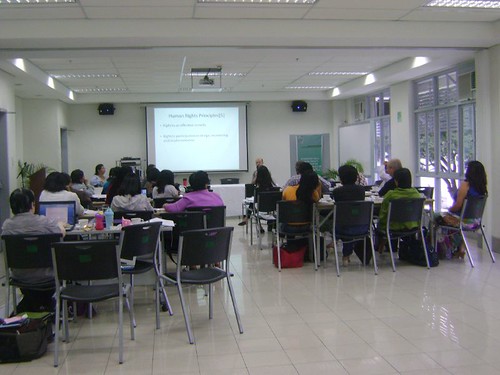
Government and non-government bodies have in recent years taken interest in human rights as a policy approach to economic issues and one practical tool developed by CSOs was the Kuala Lumpur Guidelines, launched on Human Rights Day 2010, which aims to position the centrality of human rights in economic policies related to agriculture.
The Development Alternatives with Women for a New Era (DAWN), which promotes the linkage of gender justice/women’s rights with economic justice/human rights, convened a small Asian workshop in order to explore ways in which this Kuala Lumpur Guidelines can become a tool for advancing gender justice & women’s rights among groups that work on economic justice issues in the agricultural sector.
The event, “Workshop on a Human Rights Approach to Economic Policy in Agriculture: Engendering the Kuala Lumpur Guidelines in Response to a Fierce New World,” was held at the Miriam College, in Quezon City, Philippines last January 26-27, 2011.
The Asian Farmers’ Association for Sustainable Rural Development (AFA) participated in the workshop through its Marketing Officer Ms. Victoria Serrato and Mr. Pan Sopheap, Executive Director of Farmer and Nature Net (FNN), an AFA member in Cambodia.
There were 22 participants, 1O coming from international, and 12 from local, national and regional farmers’/women organizations, academe and government agencies.
Miriam College, the International Working Group on Trade-Finance Linkages, and Agribusiness Action Initiative co-organized the workshop.
The overall objective of the workshop was to contribute to a more holistic, integrative and inter-linkages approach to analysis and advocacy among CSOs/NGOs that include women’s rights/gender justice advocates, in the Asian and Philippine contexts
The participants were given an opportunity to use the tool in the sample cases identified: fishery sector (Philippines), bottled water (Indonesia), contract farming (Cambodia), and NFA (Philippines).
The participants were divided into 4 groups, and Ms. Serrato of AFA joined the group assessing the NFA, while Mr. Sopheap of FNN joined the case on contract farming.
The workshop analyzed cases in the agriculture sector by identifying the human rights and barriers at stake, and the strategies to promote accountability and policy alternatives/options to further enhance existing policy.
One of the challenges for AFA is how to find ways to integrate HR in its policy advocacy framework within the organization and to influence other bodies and mechanisms (at the national, regional and international levels) specifically related to trade issues on the impact of human rights violations.
Click here to download the guidelines.
Click here to view more photos.



Comments are closed